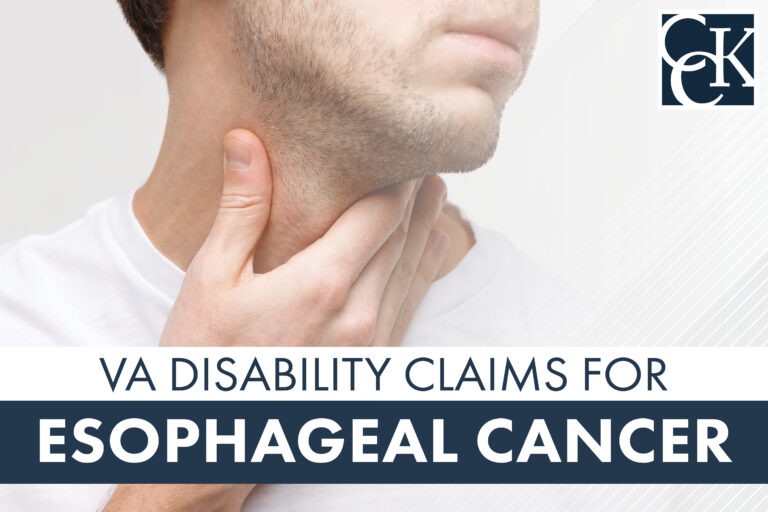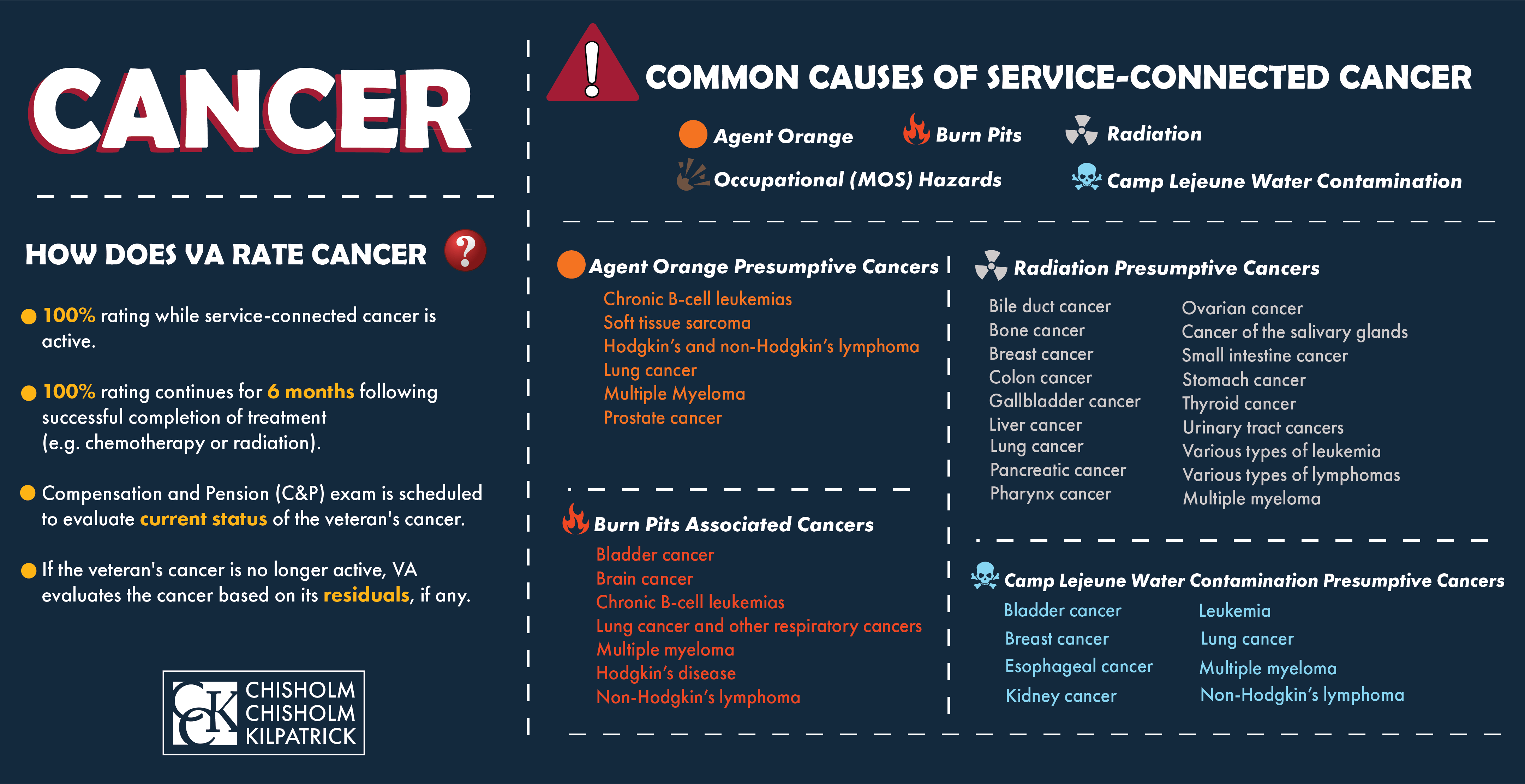VA Disability Claims for Esophageal Cancer

CCK Law: Our Vital Role in Veterans Law
Unlike most other cancers, esophageal cancer is increasing in prevalence. This cancer is notoriously aggressive and invasive, and veterans diagnosed with service-connected esophageal cancer are typically eager to obtain disability benefits that will allow them to focus on treatment and recovery.
An inappropriate claim denial, or a VA decision that results in an insufficient disability rating, will often lead to veterans wanting to file a prompt and successful appeal. An unsatisfactory VA claim decision related to esophageal cancer is often due to an issue with one of the topics below. Veterans should be aware of this information when planning their appeals.
Remember that VA appeals are time-sensitive and often complex. Please consider reaching out to an experienced, VA-accredited veterans law firm for assistance. CCK offers free case evaluations to all veterans.
Establishing Service Connection for Esophageal Cancer
Generally, proving direct service connection requires evidence of these three things:
- An in-service event, injury, or illness
- A current diagnosis by a medical professional, and
- A medical nexus, or link, between the in-service event and current diagnosis.
Veterans must demonstrate a connection between their military service and their esophageal cancer. Veterans can support their claim by securing a private nexus opinion from a medical professional and by submitting lay evidence. Lay evidence, or lay statements, can be written by the veteran or anyone who knows the veteran and can speak to their condition.

VA may also schedule the veteran for a Compensation and Pension (C&P) exam to determine if a connection exists between their military service and the esophageal cancer. C&P exams are also generally used to evaluate the severity of a condition. It is important to note that veterans requested to attend a C&P exam must do so.
Agent Orange and Esophageal Cancer
Presumptive service connection is an alternative to proving direction service connection. VA automatically presumes that certain disabilities were caused by military service when the veteran’s service falls within specific circumstances (i.e., times and locations).
Agent Orange exposure is one of the most common sources of presumptive conditions. Unfortunately, VA does not yet acknowledge esophageal cancer as a condition associated with Agent Orange. Due to this, veterans cannot obtain presumptive service connection for esophageal cancer as a result of Agent Orange exposure.
However, scientific studies do suggest a correlation between Agent Orange and esophageal cancer, which can help establish direct service connection.
Also, veterans may also be able to prove that esophageal cancer is related to Agent Orange exposure on a secondary basis. A secondary service-connected disability is a disability that resulted from a condition that is already service-connected. For example, hypertension is included on the list of presumptive Agent Orange conditions, and studies have linked hypertension to an increased risk of developing esophageal cancer. Therefore, veterans may be able to obtain service connection for esophageal cancer as secondary to hypertension.
Finally, veterans should monitor developments related to Agent Orange and presumptive conditions, as Congress has continued to update this list over time. Consider following CCK’s blog and social channels for updates.
Camp Lejeune and Esophageal Cancer
Water contamination at United States Marine Corps Base Camp Lejeune in North Carolina exposed thousands of people to serious health risks for decades. From 1953 to 1987, service members and their families living on the base were unknowingly drinking toxic water, as well as using it to cook, bathe, and wash their clothes. Veterans have since developed numerous health problems presumed to be connected to their military service at this camp.
Among the toxic chemicals found at Camp Lejeune were Volatile Organic Compounds (VOC), which included tetrachloroethylene, also known as perchloroethylene (PCE), and trichloroethylene (TCE). PCEs and TCEs can increase the risk of several cancers and Hodgkin’s disease.
Although esophageal cancer is not considered presumptive by VA, it is one of the 15 conditions eligible for healthcare benefits for those exposed to toxic water at Camp Lejeune. The Honoring America’s Veterans and Caring for Camp Lejeune Families Act provides healthcare benefits to veterans with qualifying conditions who served on active duty at Camp Lejeune for at least 30 days between 1953 and 1987.
The conditions include:
- Bladder cancer
- Breast cancer
- Esophageal cancer
- Female infertility
- Hepatic steatosis
- Kidney cancer
- Leukemia
- Lung cancer
- Miscarriage
- Multiple myeloma
- Myelodysplastic syndromes
- Neurobehavioral effects
- Non-Hodgkin’s lymphoma
- Renal toxicity
- Scleroderma
How VA Rates Esophageal Cancer
Once a veteran has established service connection for their esophageal cancer, VA will assign a disability rating.
VA should automatically assign a temporary total 100 percent disability rating to veterans with a service-connected active cancer, including esophageal cancer. This rating continues for as long as the cancer is active, and then for another six months following the successful completion of a treatment program, such as chemotherapy, radiation, or surgery.

VA will then schedule a C&P examination to reevaluate the status of the cancer. If the examination shows that the veteran’s cancer is no longer active and is in remission, then VA will assign a disability rating based on the severity of its residuals.
Do You Disagree With a VA Decision Regarding Your Esophageal Cancer Claim?
Did VA deny your claim for esophageal cancer or assign an incorrect rating? Chisholm Chisholm & Kilpatrick may be able to help you receive VA disability benefits. Our experienced team of accredited agents and lawyers has been helping disabled veterans receive the benefits they deserve for over 25 years. For a free case evaluation, call us today at 800-544-9144.
About the Author
Share this Post
